In a preceding site I shared my impressions of the “Room and a Half” museum arranged in Joseph Brodsky’s previous residing quarters in Saint Petersburg. For lack of material reveals, the museum capitalizes on emptiness, inviting site visitors to consider in the energy of the position. In contrast, the other Brodsky exhibition that opened in late December of 2021 on the premises of the Anna Akhmatova Museum, a short wander from the “Room and a 50 %,” is pretty much complete of litter. A tiny area is stuffed with hundreds if not thousands of objects that applied to belong to Brodsky at some stage of his eventful Russian-American existence.
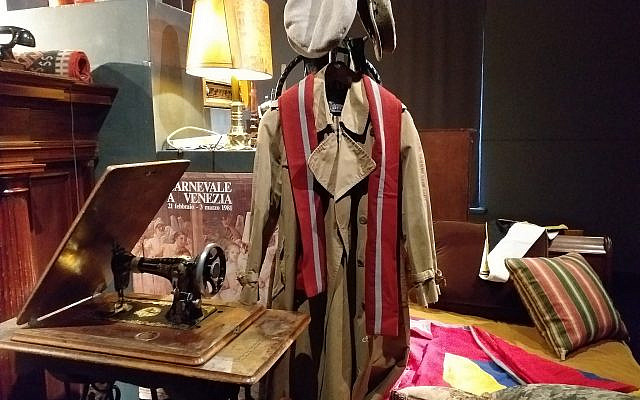 There are two monumental desks—one a present from his friend, the famous ballet dancer Mikhail Baryshnikov, a desk at which the poet was doing the job on the night of his demise. A Soviet-manufactured radio-established, a couch, ashtrays, a letter from the Nobel committee, toy troopers, envelopes resolved by Brodsky to his parents, Italian postcards, clocks, a coat, the suitcase that he took with him into exile, his mother’s Singer stitching machine, and even the steering wheel of his American car or truck! All of this is crammed jointly like a yard sale. The objects ended up donated to the Akhmatova Museum by Brodsky’s widow and his close friends.
There are two monumental desks—one a present from his friend, the famous ballet dancer Mikhail Baryshnikov, a desk at which the poet was doing the job on the night of his demise. A Soviet-manufactured radio-established, a couch, ashtrays, a letter from the Nobel committee, toy troopers, envelopes resolved by Brodsky to his parents, Italian postcards, clocks, a coat, the suitcase that he took with him into exile, his mother’s Singer stitching machine, and even the steering wheel of his American car or truck! All of this is crammed jointly like a yard sale. The objects ended up donated to the Akhmatova Museum by Brodsky’s widow and his close friends.
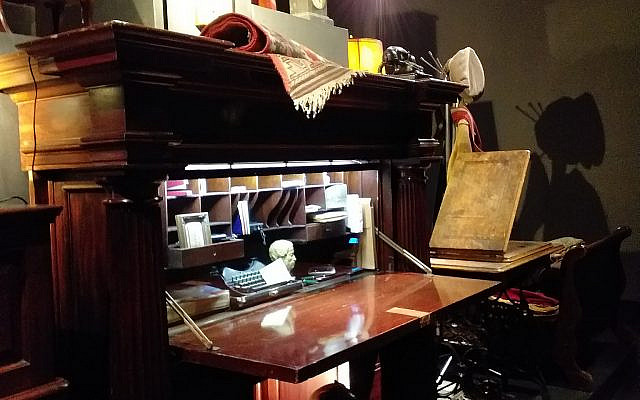 The title of this exhibition is “Joseph Brodsky. Even now Lifetime.” The recording of Brodsky looking at his poems, which includes one entitled “Still Lifestyle,” serves as a soundtrack to the exhibition:
The title of this exhibition is “Joseph Brodsky. Even now Lifetime.” The recording of Brodsky looking at his poems, which includes one entitled “Still Lifestyle,” serves as a soundtrack to the exhibition:
Matters and men and women come up
Among us. And each are stark,
and both equally are challenging on the eyes.
It is greatest to are living in the dark.
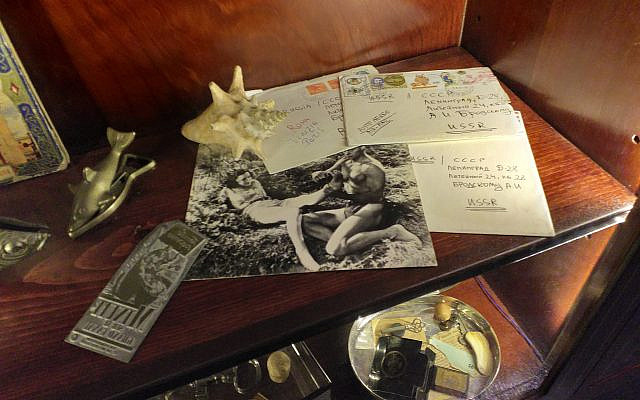 There are no explanatory notes on the partitions and the items are not even labeled. As the curator stated to me, fairly defiantly, they did not want to use standard ways – permit everyone glance at any exhibit and make up their own story…
There are no explanatory notes on the partitions and the items are not even labeled. As the curator stated to me, fairly defiantly, they did not want to use standard ways – permit everyone glance at any exhibit and make up their own story…
But you need to have to know a little bit about Brodsky’s existence to be ready to hear the voices of these issues. When Brodsky is undoubtedly an esteemed Russian-American poet and practically a cult determine in the spot of his delivery, my private working experience suggests that intellectuals in the two nations haven’t automatically read much – or any – of his poems or prose. Past winter season, although lecturing to MA students in the humanities at the Moscow Greater Faculty of Economics – arguably just one of Russia’s most elite universities – I set some of Brodsky’s texts on the examining listing. From the subsequent dialogue I felt that most college students in my viewers had study these works with intense curiosity … but for the initially time. Specified that, how a great deal can you hope of random people to the show?
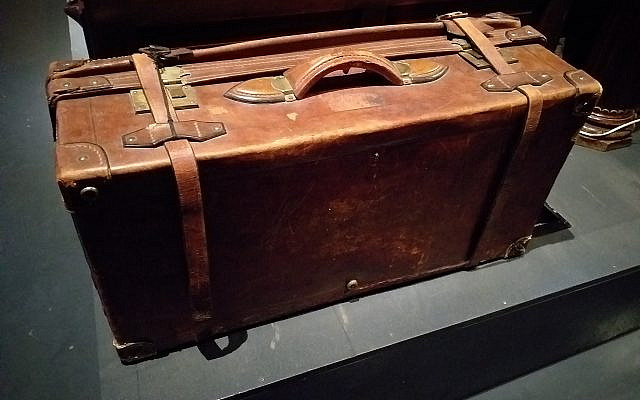
Brodsky went into exile with this suitcase in 1972
But if you know your Brodsky well it is unquestionably a special enjoyment to immerse you in this strange “still daily life,” to ponder various objects and to allow them share their tales. If in the “Room and a Half” you sense the vitality of emptiness, below it is the vitality of issues that influences you. Pretty much any item can be the starting off level for a narrative experience. For occasion, what can we hear from a minimal metallic icon, probably given to Brodsky by the grande dame of 20th-century Russian poetry, Anna Akhmatova?
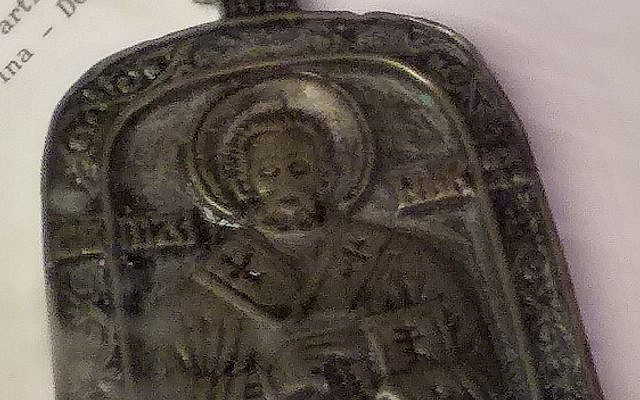 This religious item might have been for him just a cherished memento of his literary mentor. But it prompts views about Brodsky’s spiritual sentiments, his Jewishness, his affinity for Christianity and his alleged conversion. This final level is just one of the warm topics among the Brodsky’s biographers, and the jury is nevertheless out on that, probably until finally all the personalized archives at last develop into out there. Christian motifs determine prominently in his writing. Is it just proof of his appreciate for European society, Italian church buildings, and Renaissance artwork? Did Christianity at any time come to be a formal affiliation?
This religious item might have been for him just a cherished memento of his literary mentor. But it prompts views about Brodsky’s spiritual sentiments, his Jewishness, his affinity for Christianity and his alleged conversion. This final level is just one of the warm topics among the Brodsky’s biographers, and the jury is nevertheless out on that, probably until finally all the personalized archives at last develop into out there. Christian motifs determine prominently in his writing. Is it just proof of his appreciate for European society, Italian church buildings, and Renaissance artwork? Did Christianity at any time come to be a formal affiliation?
Even though Brodsky was very elusive about the area of Christian faith in his life, he was quite blunt about his Jewishness. Requested by a journalist in the wake of his Nobel award: “You are an American citizen who is receiving the Prize for Russian-language poetry. Who are you, an American or a Russian?” Brodsky answered: “I’m Jewish, a Russian poet, and English essayist – and, of study course, an American citizen.” In a movie documentary, when pressed by the interviewer about his Jewishness, he presents the pursuing reply: “I am a pure Jew on the two sides. But it is more important to outline a human getting in other conditions, significantly less abstract than nationality, faith, philosophical conceptions etc. For case in point, ‘Am I a coward or not?’ Every little thing else is far more summary.” This answer indicates a deracinated Jew who internalized the Soviet discourse of Jewishness as a “nationality” (nationality in Soviet bureaucratic jargon merely intended “ethnicity”). Jewishness was surely a truth of his delivery and biography, his “ethnicity,” but hardly an integral component of his cultural, religious or social profile. His family members belonged to a sizable course of assimilated Soviet-Jewish intellectuals, frequently ignorant of any specifically Jewish beliefs or rituals. Anti-Semitism (both equally State-sponsored and grass-roots) only would not make it possible for them ignore their track record. In the sixties and seventies, quite a few ended up fascinated with medieval Orthodox church buildings and icons. Christian faith was also a in the vicinity of-taboo in the USSR (while not to the exact diploma as Judaism). Possibly a relationship to Christianity seemed to provide a hyperlink to the European society that several Soviet Jews worshiped. In addition to, this mildly dissident interest demarcated them from the atheist Soviet mainstream with out entailing a attainable prison sentence, compared with “criminal” Zionist pursuits such as studying Hebrew or possessing a Torah. This peculiar Christian cultural affinity of Soviet Jewish intellectuals is a incredibly intricate subject matter, and I cannot give it justice in this short piece. But it is critical as a track record for Brodsky’s sights and character.
Owning still left the USSR on an Israeli visa, Brodsky was diverted in Vienna to the United States by way of the intervention of his influential Western good friends. And he in no way confirmed any curiosity about Israel. Only when he contemplated Israel as a vacation spot – as a straightforward matter of convenience: Brodsky was hoping that his father would be permitted to vacation there to meet up with with him, but his father, unfortunately, handed away just a several months right before his anticipated departure. … An accidental Jew, like a lot of of his fellow compatriots. This is probably the only issue about Brodsky that is frustratingly common.
I go away the “Still-Life” display casting a previous glance at the heap of exhibits topped by a tall trash can shaped like a Coca-Cola bottle. On the floor just beneath this symbol of American international enlargement sits a modest bust of Brodsky made by a renowned Swedish sculptor. “We wanted to reverse recurring hierarchies,” points out the curator enthusiastically.
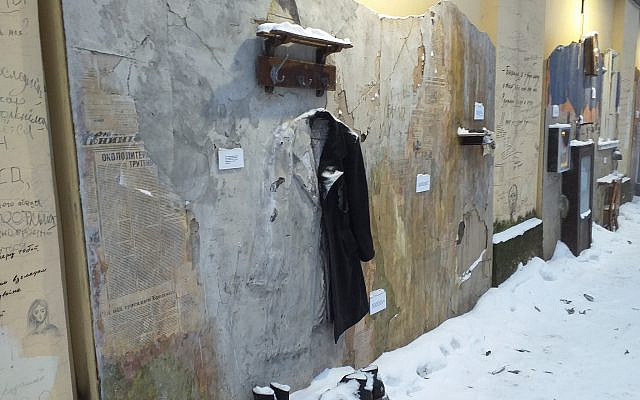
Brodsky’s memorial wall in the courtyard of the Akhmatova museum
But to feel that Brodsky has grow to be a truly popular cultural figure 1 desires to appear out into the courtyard of the Akhmatova museum. 1 wall represents a peculiar open up-air memorial to Brodsky and the Soviet period. Graffiti with quotations from Brodsky are interspersed with objects from Soviet daily everyday living, embedded in the plaster – a dish rack with some chipped plates, a cellphone booth, a coat rack. Youthful people like to go to this corner. Sipping a beer or smoking a joint, they leisurely read through Brodsky’s lines and contemplate the minimal-tech objects, reconnecting to the earth we all after inhabited…
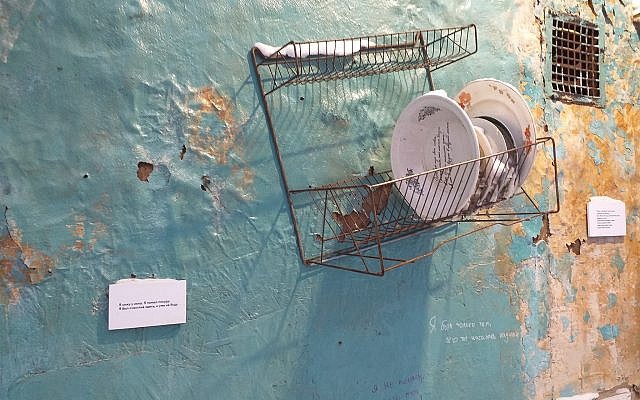
show on the “Joseph Brodsky wall” in the courtyard of the Akhmatova museum
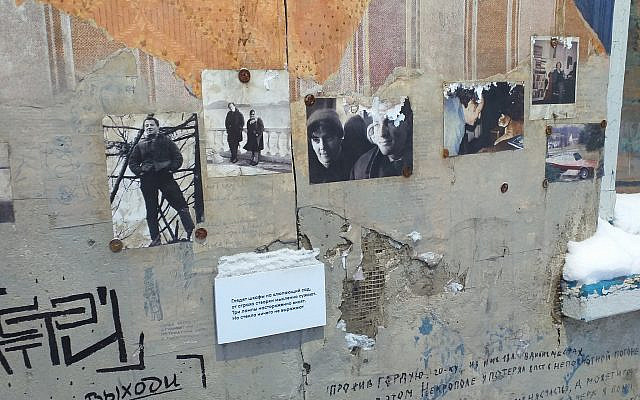
historic photographs in the courtyard of the Akhmatova museum
Maria Rubins is a Professor of Russian and Comparative Literature at University School London. Born and elevated in Russia, she analyzed at Saint Petersburg Point out University. Afterwards she moved to the Usa, where she gained her Ph.D. from Brown University. Her guides incorporate Crossroad of Arts, Crossroad of Cultures Russian Montparnasse and Redefining Russian Literary Diaspora, 1920-2020. She has translated into Russian novels of Elizabeth Gaskell, Judith Gauthier, Irène Némirovsky and Arnaud Delalande and contributed to several media stores, including BBC, Radio Liberty, NTV, Voice of Russia, Los Angeles Review of Guides, Mosaic, The New Overview, and Zvezda.
